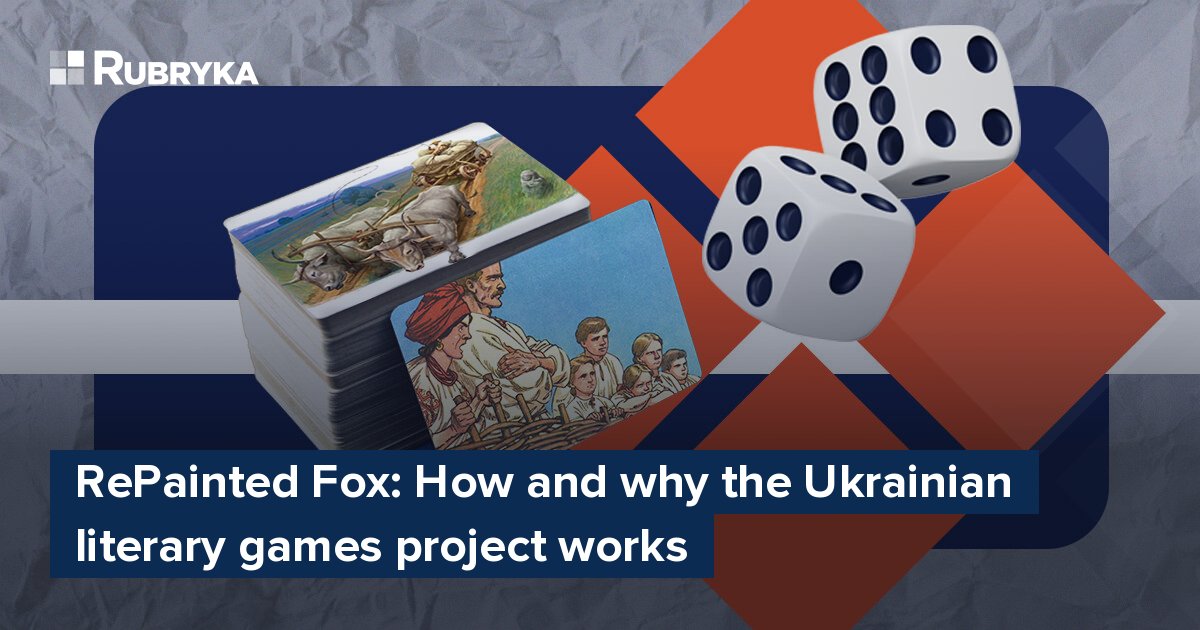
What is the problem?
The Russian Federation's war against Ukraine is not only about destroying housing and infrastructure. During the full-scale aggression, it became clear that the enemy was trying to destroy absolutely everything Ukrainian. Many Ukrainians realized that identity and originality were crucial to the nation's survival during this war. Knowing and appreciating native language, history, and cultural heritage is more critical than ever.
What is the solution?
Over the eighteen months since the Russian invasion began, there has been a significant rise in the desire to communicate Ukrainian identity. There are now language and literature clubs, libraries, culture and art centers, where folk songs are sung, patriotic exhibitions and workshops take place, Ukrainian poetry is celebrated in special evenings, and the previously forbidden history of Ukraine is being discussed.
Recently, Rubryka wrote about the interactive Lingvocid project, which called for soft Ukrainization and raising awareness. The creator of the project, educator Valentyna Merzhyievska, went on. She and a psychologist, Mariia Didenko, who shares her ideas, set up the RePainted Fox studio of literary games. The founders of this project, which the Ukrainian Institute of the Book backs, are confident that playing games allows people to explore Ukrainian literature in more depth, find new ways to interact with it and discover fresh insights and a renewed appreciation for works they know from school.
How does it work?
Reread, rethink, experience personally
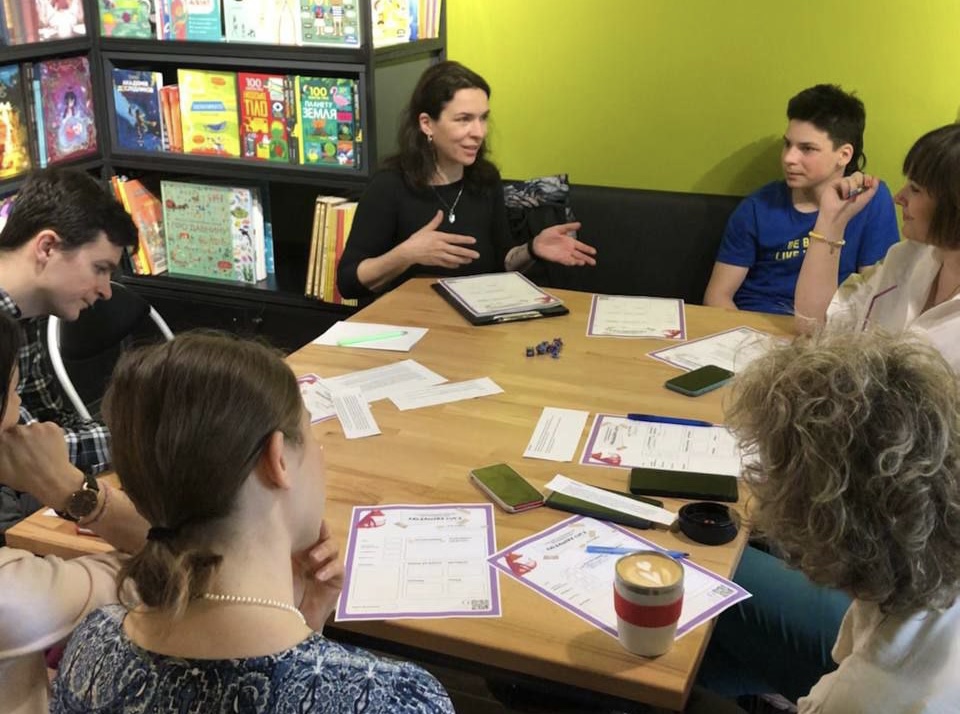
Role-playing game based on "The Kaidash Family." Valentyna Merzhyievska is in the center
The literary games studio RePainted Fox project was born during the summer of 2023, stemming from the already-existing podcast by Valentina Merzhyievska and Mariia Didenko, who reread Ukrainian literature from a school curriculum. This podcast has been going since 2020 and has put out 90 main and bonus episodes all about classic literature. Looking back at stories, novels, and fairytales that we knew as kids helps us to understand them in a new way and even helps us understand ourselves better. After all, many works included in the school curriculum leave a depressing aftertaste or remain incomprehensible. This is not surprising – most of the works from the school curriculum were not written for children or teenagers but for adults.
The creators of RePainted Fox say that the project will help people look at the classics anew and leave behind any preconceived notions they may have acquired in school. It also encourages people to delve into their innermost selves, be aware of stereotypes, and liberate themselves from any restrictions. What's more, the school program is a cornerstone of Ukrainian society. The authors of the idea think that the works that most Ukrainians are familiar with could help foster a better understanding of themselves and promote understanding in society.
"Literature really plays an important role when it comes to this because it can illustrate how characters feel and what they're thinking in ways that readers can relate to. Literature and society interact with each other, where ideas and concepts that exist in the real world can be seen within the literature. Yet, literature can also shape readers and how they may act and respond to the world around them," Valentyna Merzhyievska, the co-founder of the RePainted Fox project, explains. "However, no matter how much empathy we feel for the characters while reading the book, no matter how deeply we delve into analyzing the motivations and values of the characters, it remains mostly an outside view. But we wanted to find a form of deeper immersion. And one day, it hit us: a game that'll let you really immerse yourself in the story, become a character, get a feel for it, and even try to change the plot. That's how our literary gaming studio was born."
Currently, the project has four types of games:
- a role-playing game based on Ivan Nechuy-Levytskyi's "The Kaidash Family" for 8-12 players;
- a game meditation with a paper folding by artist Anastasia Hornichar – a game about burnout and recovery based on Mykhailo Kotsiubynskyi's "Intermezzo";
- a "mafia" type game based on Panas Myrny's "Do the oxen roar when the manger is full" that needs at least ten players;
- and a game about the poems of Ukrainian poets called "Bouts-Rimés"
Participation in the games is free and available to everyone.
The RePainted Fox project, which is a reference to Ivan Franko's famous tale, has a special meaning. Everyone's familiar with this story from when they were kids in school. But this project gives us a new perspective to think about it and make connections with our modern life.
Why the game?
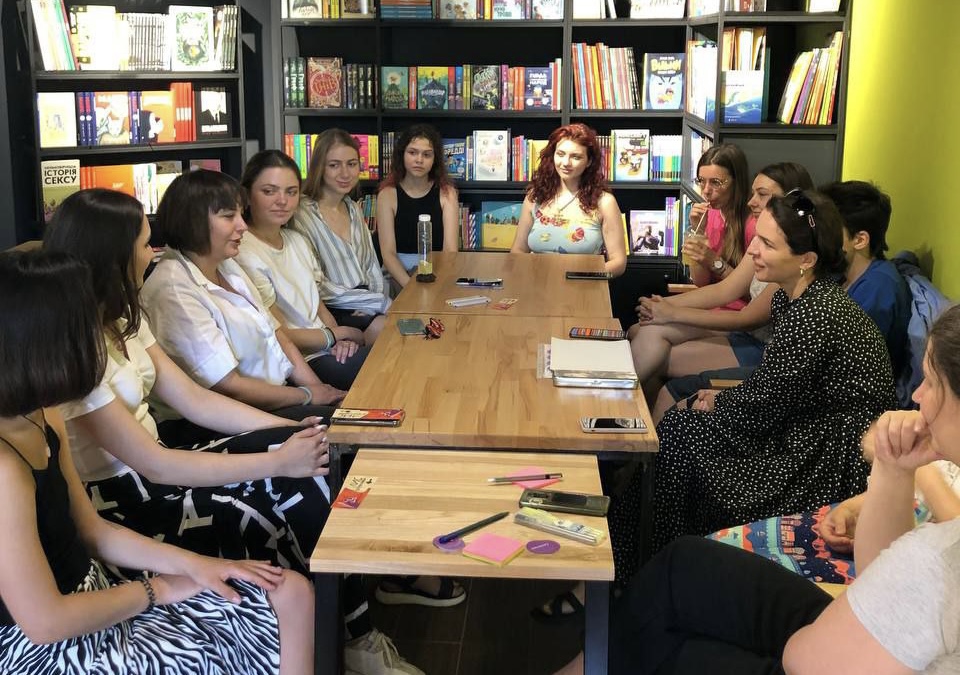
Mafia-type game based on the novel by Panas Myrny, "Do the oxen roar when the manger is full"
The project's founders say that the game is an effective way to break down stereotypes. People don't have to worry about making mistakes because there are no fatal consequences — it makes them feel light and free. Different behaviors can be tried out, the effects seen, and then that experience can be applied to real life — it's like having the ability to "replay" everything.
In RePainted Fox, the authors pick certain role-playing or psychological game mechanics for every single literary piece so you can dive into the story, watch unique scenarios, alter reactions, and try different characters' roles so you can get the hang of their motives, weak points, and strong sides. These activities allow you to step outside your comfort zone and experiment with novel solutions. Ultimately, every game ends with a thought-provoking self-reflection and – perhaps – a rethinking of one's views.
To create a game based on a literary work, you need not only to have an idea but also to make several test games, gradually refining the balance and dynamics of the game. That's why this project has a studio format — that is, it's a space where players are co-creators simultaneously. Games at RePainted Fox don't follow the same pattern as a theater. The director has a plan there, and the actors work to bring it to life. Nobody, including the game creators at the RePainted Fox studio, knows what the game will become. It's a collaborative effort, and what transpires happens through the dialog of the players.
"We tweak the game as we go along, ironing out any points that need clarification. And something really essential to any game is introspection. And this can only come from the players. We're fortunate that our podcast listeners and studio guests take this seriously, and sometimes we are surprised by really amazing moments, thanks to them," Valentyna Merzhyievska says.
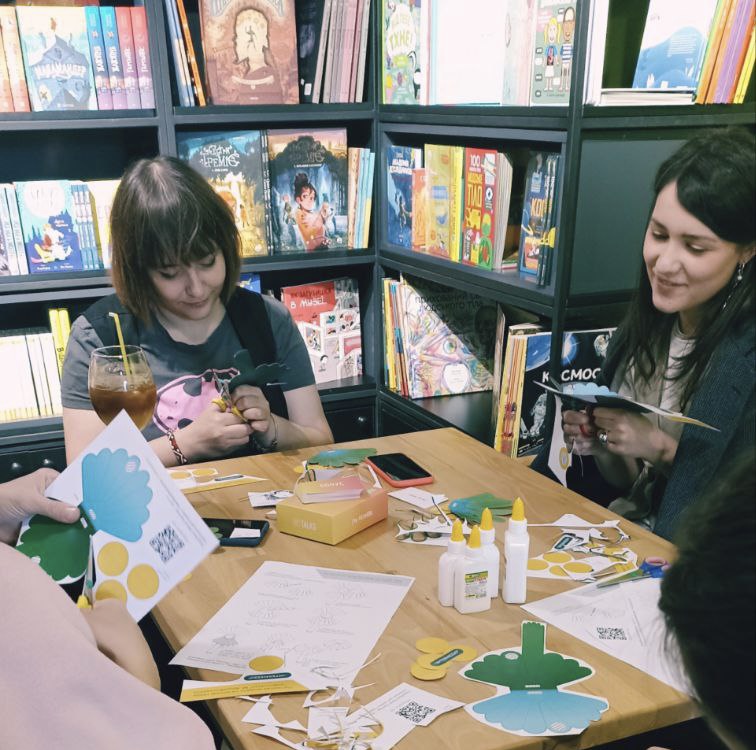
Mariia Didenko (on the left) is hosting a game meditation on burnout and recovery based on Mykhailo Kotsyubynskyi's "Intermezzo"
"For me, the game is about the variability of choices, alternative scenarios, and expanding possibilities," – Mariia Didenko, co-founder of the project, adds. "Playful people (those who know how to play and involve others in the game) are free, relaxed, and curious. As a psychologist, I'm particularly interested in reflecting on the game afterward, as I don't believe everything that happens is incidental. This is another tool of self-discovery, so it's fascinating to ask questions like "What do I share in common with this character and what sets us apart?", "What was my thought process when making decisions in-game, and is it the same as in real life?", "How can I use the strength of this character to empower myself?". It's cool when very different people come to the game with different experiences and backgrounds – then, on the one hand, there is no pressure to fit in; on the other, you see that even such different people are united by their interests in Ukrainian literature and culture."
Moving beyond persistent stereotypes to gain an understanding of one's own identity
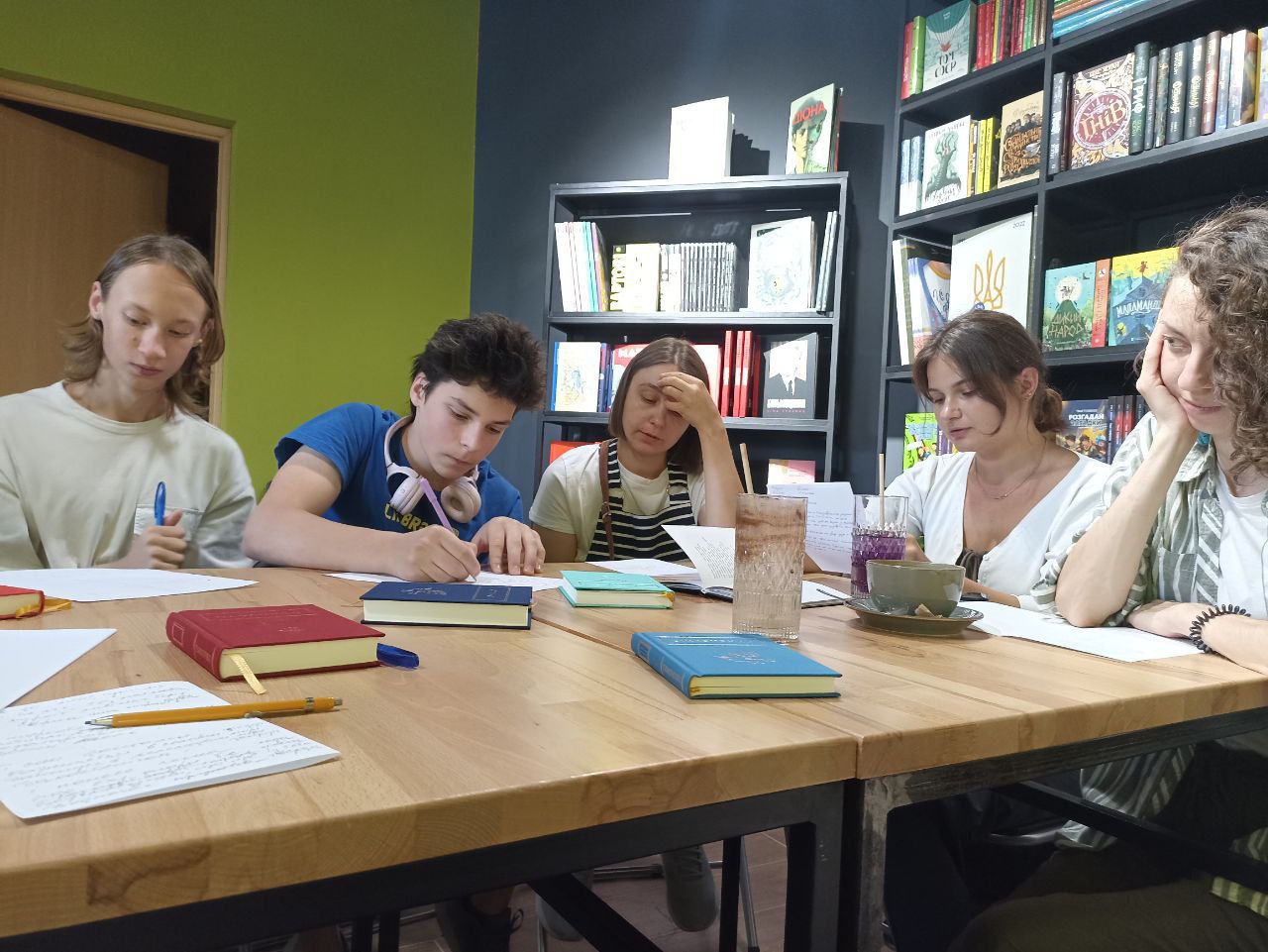
Playing "Bouts-Rimés for the poems of Ukrainian poets"
The RePainted Fox project has several tasks:
- To get rid of the various stereotypes that grown-ups who were taught literature in school may have about Ukrainian classics, like thinking that it's about only tragedy, serfs, or the struggle for freedom; to weaken prejudices and interest in it; to encourage re-reading in adulthood to form one's impression.
- To motivate examining not only the works themselves but also the personalities of the authors and the historical context of the writing of the works;
- To suggest keys for teachers to use when discussing complex works, taking into account the age characteristics of their students.
But there are deeper motives. The authors of the project share that they strive to find in literary works models of behavior characteristic of Ukrainians, which are brought up from generation to generation: specific traditional life steps and usual reactions to certain events. While playing with other players, analyze them and decide wisely whether you should imitate them or correct them.
Furthermore, Mariia and Valentyna argue that constructing these literary games can aid in recognizing the ideologies and their implications in literature and, by extension, applying them to real life. For example, a common motif in many works amongst Ukrainian classics is the pursuit of liberty, yet not all of these characters can fully use that freedom. It's not common to find stories where the characters prioritize education. Usually, the main characters get themselves into trouble due to their inner discord.
Mindful reading is in itself a verbal and reflective practice. Revisiting childhood stories can help you better grasp the social and cultural norms of the world around you, discovering more about your roots and your identity.
However, the game studio not only has discussions about the book but also offers the chance to experience the book through action. This helps provide a deeper understanding of the story and create new, more meaningful connections – you can both feel and see it and feel for the other characters. Playing games can broaden the range of experiences and make them unforgettable.
Did they really succeed?
First, RePainted Fox – both podcast and games – is for adults of all ages who want to discover Ukrainian classics in a new way. Also, some of our listeners and participants are educators, librarians, and group curators who work with children and teenagers. The authors of the concept wish that the people taking part in it will be able to apply the insights they get from playing the game in their actual lives. Then there are the parents, who can draw on the understanding of literature that the game gives and use that to teach their kids, and in the process, create an extra opportunity for talking and knowing each other better through playing.

The process of playing "The Kaidash Family" by Ivan Nechuy-Levytskyi
Participants are already sharing their impressions of the RePainted Fox games. Oleksandra, the book blogger "Zapekla Knyhozherka", says:
"This is a completely new level of book leisure. We played something like D&D (Dungeons and Dragons) based on " The Kaidash family". A fascinating role-playing game, much larger than the traditional discussion of the work and characters, was emotional, and deep, with a stronger emphasis on psychology. It was so much fun! I got to be Motria, and we all competed for a pear tree. In the end, I made everyone drink tincture (unfortunately, only imaginary, but it was only the first meeting)."
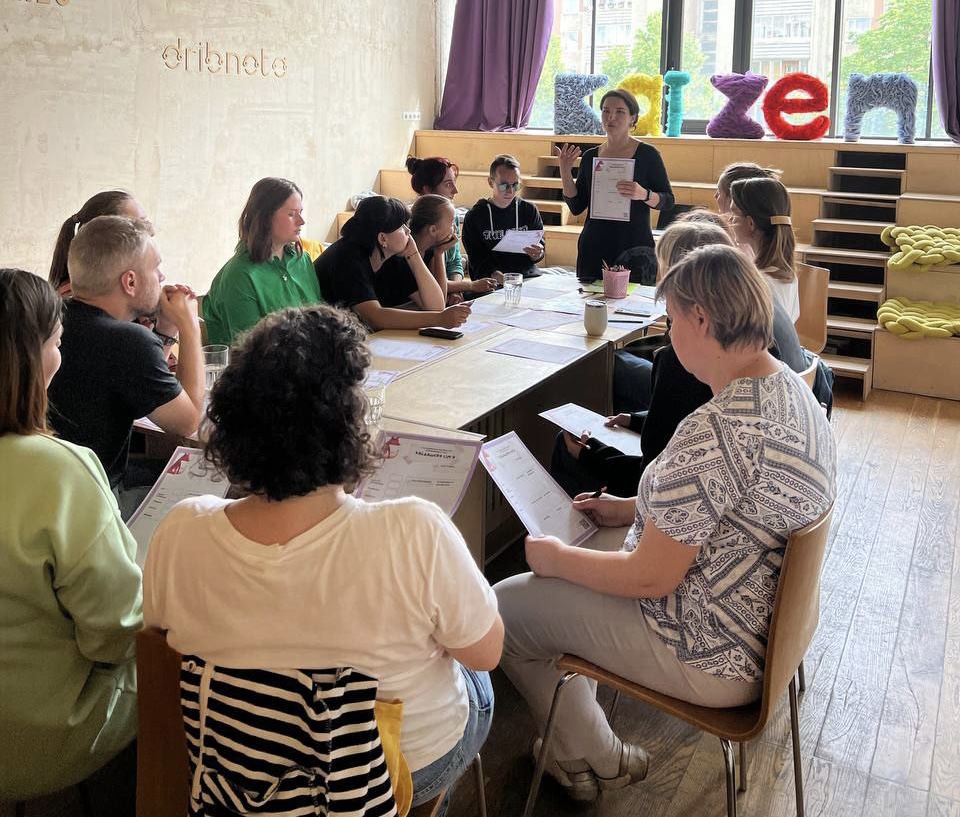
The Kaizen school teachers are playing "The Kaidash Family"
Tetiana, a teacher at the Kaizen school, also played the game "The Kaidash Family" with her colleagues:
"It was very cool! It was really enjoyable being someone else, developing a character for them, and watching how they interacted with the other important characters. It's cool to watch your colleagues from the outside and see how we interact in such a situation."
Anna, the founder of the Kaizen school, states that the circumstances of the plot enabled her to observe how her colleagues acted in unusual circumstances, thus revealing their leadership and creative capabilities.
Playing literary games in the studio can be a form of emotional release. Maryna, a mother, and journalist, jokingly recounts how her family and friends, upon noticing her exhaustion, offered her all sorts of advice, from beekeeping and embroidery to strolling in the woods and even getting a pet – whether it's a cat or dog, or shark, or even Baby Yoda. All this is to escape the draining reality for a bit and relax. However, Maryna found sustenance precisely in the literary games of the RePainted Fox project:
"We were mulling over "Intermezzo"… In front of us were pieces of paper with a diagram of a green shell, inside which the golden pearl of peace should be placed. We were cutting, sticking, conversing… The whole experience threw me into a trance-like state. My mind seemed to be soaring around, watching how the details came out from under the scissors, how the glue connected them into a product, and how our casual conversation flowed while simultaneously creating a feeling of safety and protection. It's hard to believe that such mindfulness could exist within the genocide, during the war."
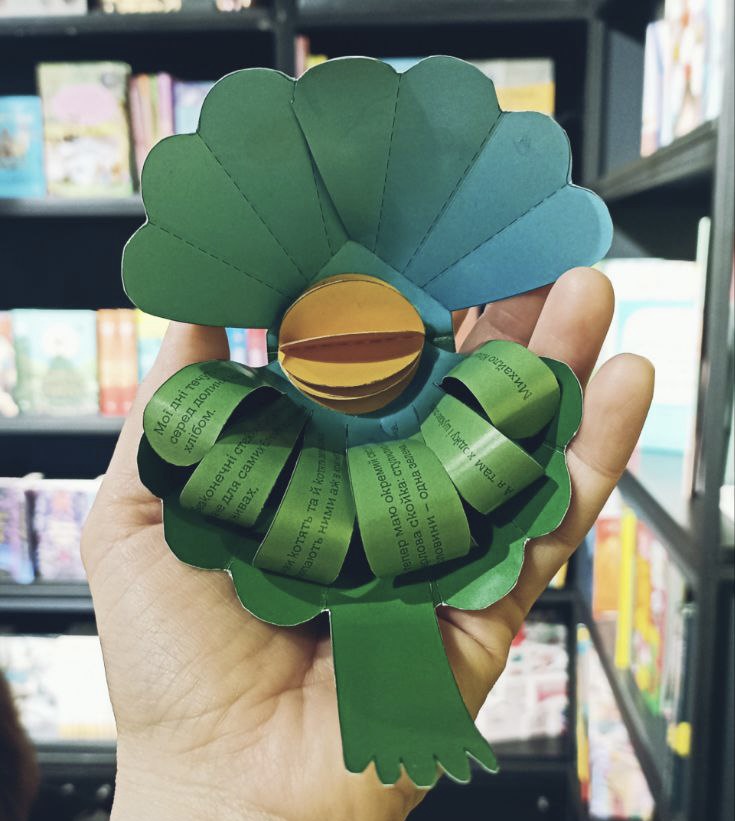
Paper folding shell for a game based on the motifs of "Intermezzo" by Mykhailo Kotsiubynskyi
The project's founders believe gaming can help people adjust to changes more easily.
"The full-scale war pushed Ukrainians out of their comfort zone, forcing them to pick up new skills quickly. Amazingly, it turned out that the gaming experience was invaluable: flying drones with a joystick, negotiating, taking up new roles, languages, logistics, and so much more. All these skills could be honed in video games, which really helped many people out," Valentyna Merzhyievska says.
Even more helpful solutions!
In October, the project, which started this summer in Kyiv, will be touring around other cities in Ukraine. There are seven stops in total – Lviv, Ternopil, Vinnytsia, Kropyvnytskyi, Kharkiv, Poltava, and Ivano-Frankivsk. The tour is meant to show the people of Ukraine all the unconventional ways you can work with literature.
"For me, a tour is a chance to spread a new cultural movement outside Kyiv. I traveled a lot in Ukraine with educational seminars before, and I really got something out of it. Events in the capital are usually more diverse. Still, in smaller cities, there is more of a need for cultural exploration, connecting with others who share your interests, and inventing something fresh. It's delightful to share exciting discoveries and findings. It's a great feeling in itself, but it's also important to communicate with each other to create a sense of unity and trust. This will help us stand up to any external challenge and keep advancing as a society. So, we can have fun now and make a difference in the future," Valentyna Merzhyievska explains.
See all the details about the tour and other events on the project's social networks, Facebook or Instagram. Participation in the games is free.
If, after donating to Ukraine's armed forces, you have financial resources for cultural and educational projects and want to support the RePainted Fox project, you can do this through Monobank or patronize the project on Patreon. You can become an ambassador of the project by following the link.


